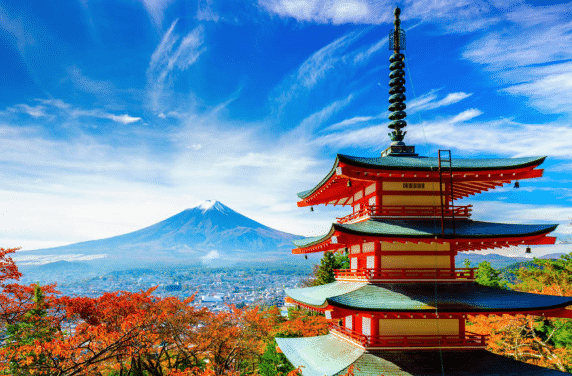DISCLOSURE: This post may contain affiliate links, meaning when you click the links and make a purchase, I receive a commission. As an Amazon Associate I earn from qualifying purchases.
Japan is no doubt one of the most amazing countries in the world today. From its wonderful people and awesome culture to jaw-dropping giant strides in technology, the country’s present state leaves a lot of questions in the curious mind.
If you’ve always wanted to unravel the mysteries behind the evolution of Japan through several centuries to what it has become today, then you’d need to dig deep into the country’s history — by reading books on the subject.
Here are five of the best books on Japanese history.
#1. A Modern History of Japan: From Tokugawa Times to the Present
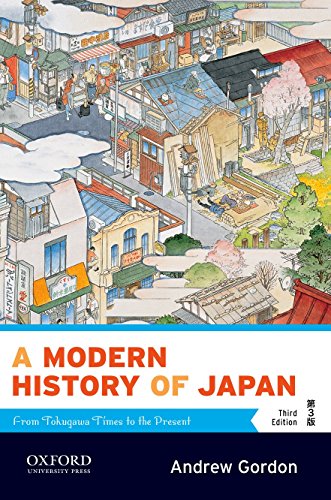
This book details the last two centuries of Japanese history, starting from events that occurred during the days of the Tokugawa feudalism to the 19th century revolution by the samurai that modernized the country. The book also explains how the country gradually adopted Western culture, military strategy, and politics after the First World War.
The current edition of the book covers Japan’s historical timeline from 1989 to 2008 and includes a brand-new chapter that analyzes some of the recent national problems faced by Japan, such as the 2008 financial crisis and the Tohoku earthquake and tsunami that happened on March 11, 2011.
If you’re looking for a book that tells the story of modern Japan without forcing any stereotypes or half-truths down the readers’ throats, then this book is your best bet. Whether you’re a student of Japanese history or you just love reading history as a hobby, you’re more than likely to love this book, which was written by one of the finest scholars of Japanese history. And unlike most other books on the topic, the book is written in simple, clear, enjoyable and entertaining language.
Note that this book was meant to be a succinct account of Japanese history. So, don’t expect very in-depth details of events. If you’re looking to know exactly why the Japanese had made some of the mistakes they made in the past, or the exact smart approaches they adopted to successfully convert their country into one of the world’s most industrialized countries, then this book might not help your curiosity. Nonetheless, the author did a great job at linking facts and events, and causes and effects to paint a comprehensive picture of Japan’s history.
- Author: Andrew Gordon
- Publisher: Oxford University Press
- Current edition: 3rd edition (March 2013)
- Pages: 432
>>> Buy Now or Rent on Amazon.com
#2. Japan: A Modern History
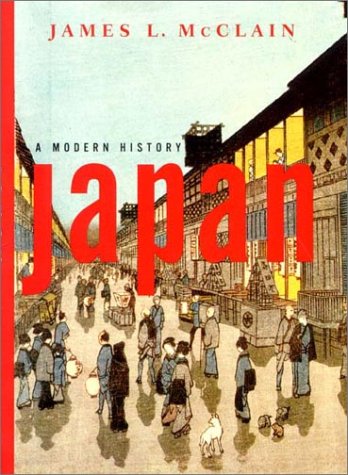
This is another comprehensive book on Japanese history, covering political, social, cultural, and economic events from the Tokugawa times in the 1600s to present day. The book details some important social events in Japan’s history that most other historians overlooked. Although it is rendered in a somewhat informal writing style, it would work well as a text for undergrad college courses on Japanese history as well as for non-academic readers.
One of the upsides of the book is that it includes analytical explanations on how Japan’s economy and politics has affected some other aspects of the country’s development, such as industrialization. The author did a good job at treating all historical characters with analytical fairness. Where he discusses the motives behind each one’s actions, he expresses sympathy for their peculiar circumstances and avoids painting them with any adjectives that might lead to stereotypes.
In addition, the author was able to escape the heavy hand of stereotypes about Japanese history about those countries that contributed significantly to the country’s history (such as China, Russia, the UK, and the USA.).
- Author: James L. McClain
- Publisher: W. Norton & Company
- Current edition: 1st edition (January 2002)
- Pages: 752
>>> Buy Now or Rent on Amazon.com
#3. A Concise History of Japan
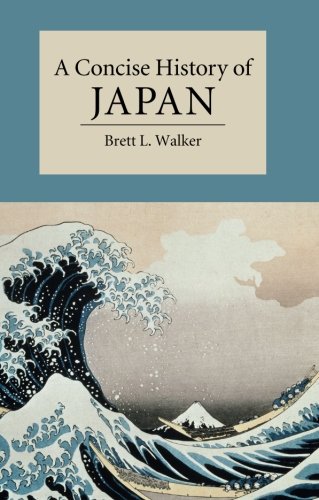
This book by Brett Walker is a brief, yet detailed account of Japanese history, starting by tracing Japan’s early history through findings of archeological remains and moving on to other events including civil conflicts, the rise of the samurai, encounters with European countries, and modern day social, political, cultural, and economic events. For the curious mind, the book particularly details how Japan picked herself up from the ashes of the second World War and became the highly industrialized, thriving country we have today.
In its first chapter, the book gave some information about the ancient Jomon people (early hunter gatherers who lived from 14500 to 300 BC and were known for their exquisite pottery, which still remains dazzling and impressive today). In subsequent chapters, the book deals with other significant events in Japanese history, including the smallpox outbreak in 737, the rise of the samurai, the period of Tokugawa shogunate, the eras of Oda Nobunga and Toyotomi Hideyoshi, the start of Japan’s modernization in 1868, the Meiji Restoration, the Sino-Japanese war in 1895, and other events down to the massive earthquake of March 2011. All of these in only about 350 pages!
Written in crisp, clear language, this book also takes particular interest in the environmental challenges faced by the Japanese over the years and how the challenges were surmounted. In all, the book integrates the pageantry of Japan’s history with modern day environmental concerns. So, if you’re always interested in environmental sciences or related discourses, you would most likely enjoy this book.
- Author: Brett L. Walker
- Publisher: Cambridge University Press
- Current edition: March 2015
- Pages: 359
>>> Buy Now or Rent on Amazon.com
#4. A History of Japan
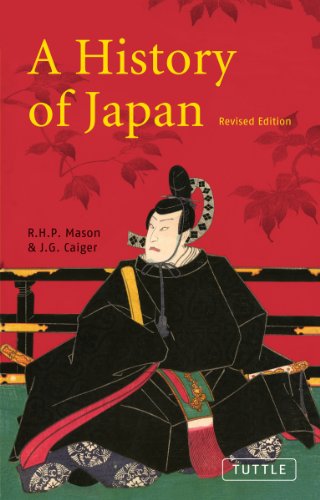
Like others in this list, this book is a single volume complete Japanese history, starting from ancient Japan through the feudal years to the period following the Cold War and to the crash of the Bubble Economy in the 1990s. The current edition lays emphasis on the origins on Japanese civilization and culture, and critically analyzes Japanese arts, religion, and people from 600 BC to present day.
The current edition breaks down the period in Japanese history into four:
- Archaic Japan: Yamato, the Nana and Heian periods, and the creation of a unified state.
- Medieval Japan: Buddhism, Kamakura and Muroachi periods, rule by military houses, and the failure of the Askikaga rule.
- Early Modern Japan: society and culture in early modern Japan, and the Japanese feudalism under the Tokugawa administration.
- Modern Japan: modernization policies, the Meiji era, from consensus to crisis (1912-1937) and eventual solutions through force.
While many readers have admitted that the book is a good read, some complained about some aspects of it, such as the writer’s style of writing and his way of giving too much (useless) detail about topics that are not significant (for example, there are some pages of the book containing Nara poems translated in English, which the author does not explain the significance of.)
- Author: R. H. P. Mason, J. C. Caiger
- Publisher: Tuttle Publishing
- Current edition: Revised edition (November 1997)
- Pages: 408
>>> Buy Now or Rent on Amazon.com
#5. Hirohito and the Making of Modern Japan
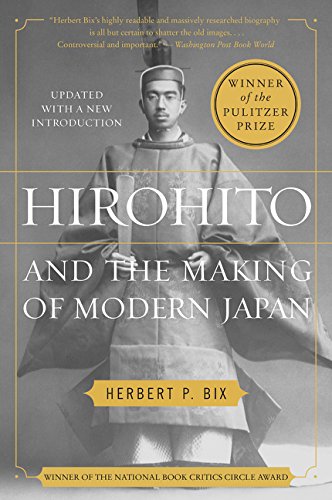
Written by Herbert Pix, this book does not cover a long stretch of Japanese history as other books in this list have done. But if you’re looking to understand how Japan transitioned into the modern world under the reign of Emperor Hirohito as well as the pre- and post- WW2 Japan, then you’d need to get this book.
Aside revealing the full life history of this controversial ruler with amazing clarity, this book sheds new light on historical events such as the China war and the Asia-Pacific War as well as their impacts on Japan. It also reveals the emperor’s roles in the events of the second World War and why the Japanese society is what it is like today.
While the book unravels many mysteries surrounding Hirohito and his influence on the making of modern Japan, the author stated clearly that there are still some pieces information not yet available to researchers. Nonetheless, anyone who interested in Japanese history would love this book, a Pulitzer Prize winner and one of the bestselling books on the subject.
- Author: Herbert P. Bix
- Publisher: Harper Perennial
- Current edition: Reprint edition (September 2016)
- Pages: 880
>>> Buy Now or Rent on Amazon.com
Related
- 20 Best Books on Crusades (2022 Review)
- 20 Best World War 2 History Books (Fiction & Nonfiction)
- 19 Best Books on World Religions (2022 Review)
- 20 Best World History Books (2022 Review)
- 5 Best Books on Russian Revolution (2022 Review)
- 20 Best Books on Roman History (2022 Review)
- 20 Best Books on Watergate Scandal and Nixon
- 6 Best Books on Chinese History (2022 Review)
- 20 Best Books on The Romanovs (2022 Review)
- 20 Best Books on Thomas Jefferson (2022 Review)
- 20 Best Greek Mythology Books (2022 Review)
- 20 Best Books on Nikola Tesla (2022 Review)
- 20 Best Books on Albert Einstein (2022 Review)
- 5 Best Books on Japanese History (2022 Review)
- 20 Best Early American History Books (Native, Latin, Nonfiction, African)
- 20 Best World War 1 Books (2022 Review)
- 20 Best Civil War Books (2022 Review)
- 20 Best Theodore Roosevelt Books (2022 Review)
- 18 Best Books on Howard Hughes (2022 Review)
- 20 Best Books on Stalingrad (2022 Review)
- 20 Best Books on Queen Victoria (2022 Review)
- 20 Best Books on Andrew Jackson (2022 Review)
- 20 Best Books on Alan Turing (2022 Review)
- 20 Best Books on Genghis Khan (2022 Review)
- 20 Best Books on Benjamin Franklin (2022 Review)
- 20 Best Books on Patton (2022 Review)
- 20 Best Books on Alexander Hamilton (2022 Review)
- 20 Best Books on French Revolution (2022 Review)
- 20 Best Books on Alexander The Great (2022 Review)
